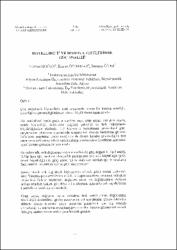| dc.contributor.author | Doğan, Nurhan | |
| dc.contributor.author | Özdamar, Kazım | |
| dc.contributor.author | Öner, Setanay | |
| dc.date | 2014-11-07 | |
| dc.date.accessioned | 2014-11-07T08:27:59Z | |
| dc.date.available | 2014-11-07T08:27:59Z | |
| dc.date.issued | 2007 | |
| dc.identifier.issn | 1302-3187 | |
| dc.identifier.uri | http://hdl.handle.net/11630/677 | |
| dc.description.abstract | Çok değişkenli hipotezlerin testi sonucunda alman bir kararın tutarlığı, geçerliği ve güvenirliği bilimsel olarak büyük önem taşımaktadır.
Bir istatistiksel testin gücü, a yanılma payı, grup sayısı, değişken sayısı, örnek büyüklüğü, değişkenin değişim genişliği ve fark vektörünün büyüklüğünden etkilenir. l-(3 biçiminde hesaplanan istatistiksel güç, araştırmanın planlama aşamasında araştırıcının alacağı kararların gücünü belirleme, araştırma sonuçlandığında da alman kararın güvenirliğini test etme ve yeterli güvenirlikte kararın alınıp alınmadığını denetleme açısından uygulanması gereken bir yöntemdir.
Bu çalışmada, çok değişkenli varyans analizinde güç, değişik I. Tip hata(a), II.Tip hata (P), merkezi olmayışlık parametresi (X), etki büyüklüğü (ES), örnek büyüklüğü (n), grup sayısı (g) ve değişken sayıları (p) ile ortalama fark vektörü büyüklüğü (d)’ne göre incelenmiştir.
Sonuç olarak çok değişkenli hipotezlerin yüksek güçle testini sağlamak için; Yanılma payı a=0.05’ten a=0.01’e doğru azalırken, ortalama vektörler arasındaki farklar büyürken, değişken sayısı ve değişkenlerin değişim aralığı artarken yüksek güç değerlerine ulaşmak için daha çok sayıda birim üzerinde çalışmak gerekmektedir.
Grup sayısı, değişken sayısı, ortalama fark vektörlerinin değerlerinin büyüklüğü istatistiksel gücün azalmasına yol açmaktadır. Bütün faktörleri dikkate alarak istenilen güçte araştırma planlamak için kaç örnekle çalışılacağı ve araştırına sonuçlandığında verilen kararın gücünü belirlemek için güç analizi yönteminden yararlanmak gerekir. | en_US |
| dc.description.abstract | The validity, reliability and feasibility of the decision resulted from the test of multivariate hypothesis play a salient role in science.
The power of a statistical tast is influenced by alpha error level, the number of the group, the number of variables, the size of sample, the variation width of the variables, and the size of the vector difference.
The statistical power calculated as a one minus beta is the essential method applied in determining the researcher’s decision in the planning phase of the study, in testing reliability of the decision as a result of the study, and in checking if the reliable results are obtained.
In this study, the power in the multivariate analysis of variance was examined according to a different type I error (alpha), type II error (beta), non-centeral parameter, effect size, sample size, the number of groups, the number of variables, and size of mean difference vector.
As a result, in order to obtain the testing of multivariate hypothesis that has the highest power.
It is necessary to work on higher number of units to reach the highest power rate when an error level is decreasing from 0.05 to 0.01, when differences among mean vectors were increasing in size, and when the variation interval of variables is rising.
The number of groups, the number of variables and the size of the value of mean difference vectors cause a decrease of statistical power.
Considering all the factors, the number of subjects should be taken into consideration in order to plan a well-designed study. Besides, it is necessarily important that to benefit the power analysis method to be able to determine the power of decision as a result of the study. | en_US |
| dc.language.iso | tr | |
| dc.publisher | Afyon Kocatepe Üniversitesi | en_US |
| dc.relation.ispartof | Fen Bilimleri Dergisi | |
| dc.rights | info:eu-repo/semantics/openAccess | en_US |
| dc.subject | İstatistiksel Güç Analizi, Hotelling T2, MANOVA, I. Tip Hata, İL Tip Hata | en_US |
| dc.title | Hotelling T2 Ve Manova Testlerinde Güç Analizi | en_US |
| dc.title.alternative | Power Analysis In The Hotelling T2 And Manova Tests | en_US |
| dc.type | Article | |
| dc.department | Afyon Kocatepe Üniversitesi Veteriner Fakültesi, Biyoistatistik Anabilim Dalı, Osman Gazi Üniversitesi Tıp Fakültesi, Biyoistatistik Anabilim Dalı | en_US |
| dc.identifier.volume | 7 | en_US |
| dc.identifier.startpage | 331 | en_US |
| dc.identifier.endpage | 343 | en_US |
| dc.identifier.issue | 1 | en_US |
| dc.relation.publicationcategory | Makale - Ulusal Hakemli Dergi - Kurum Yayını | en_US |



















